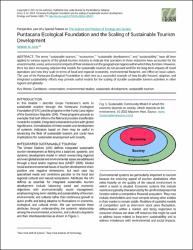| Sinopsis: | The terms “sustainable tourism,” “ecotourism,” “sustainable development,” and “sustainability” have all been applied to various aspects of the global tourism industry to indicate that operators in those industries have accounted for the environmental, social, and economic impacts of their endeavors on the geographical regions within which they function. However, there has been increasing criticism that models for sustainable tourism do not account well for the long-term impacts of resort operations and how they scale in terms of local and regional economies, environmental footprint, and effect on local culture. The case of the Puntacana Ecological Foundation is cited here as a successful example of how locally focused, adaptive, and integrated sustainability efforts may provide useful models for the scaling of durable sustainable tourism activities in other regions and globally.
|


